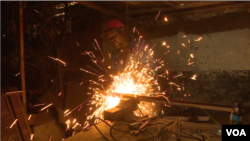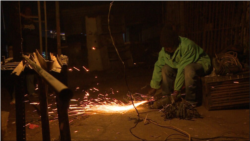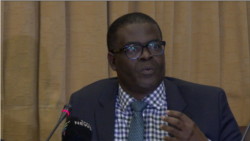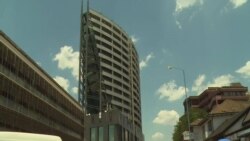Most parts of Zimbabwe's capital get electricity for only seven hours per day, and the hours usually come overnight, when there is less usage and power stations can meet demand.
Once the electricity comes on around 10 p.m., Harare lives up to its local title as "the city that never sleeps."
For the next five to eight hours, businesses that need electricity to function spring to life, even on cold, blustery winter nights.
Nelson Muzhuwe, who manufactures door and window frames, says he is recovering from a cold he caught while working overnight. He has an appeal to President Emmerson Mnangagwa's government.
"If the government can give us electricity during the day, l think we can be able to meet our targets, because we [are] actually getting some orders from clients and we won't be able to meet our targets," Muzhuwe said. "l have got a lot of complaints. You know what happens when you get a deposit from my client? They think [I] am being slow with my work, but there are some factors affecting us."
Other business owners say they have tried to use generators so they can work during the day, but fuel, like many other basic goods in Zimbabwe, is scarce and expensive.
This week, Mnangagwa dispatched his energy minister, Fortune Chasi, to negotiate with Mozambique and South Africa to provide more electricity to Zimbabwe.
Harare hopes the talks will bear fruit after it paid $10 million in debt to South Africa last month.
Chasi says the government can retire the remaining debt of $70 million to South Africa only if citizens pay about $100 million they owe to the country's utility company, the Zimbabwe Electricity Supply Authority.
"We need to pay our debts to assure ourselves of power," Chasi said. "I want to make a specific public appeal to commerce and industry that owe significant amounts of money. Without power they cannot operate, and when they cannot operate life becomes very difficult for all of us."
While the economic impact of the power shortage is not clear, experts say the moribund economy will suffer even more if the situation is not quickly addressed.
Muzhuwe will suffer, as well — from loss of income and possibly clients, and from the health effects of working throughout the cold, winter nights.








